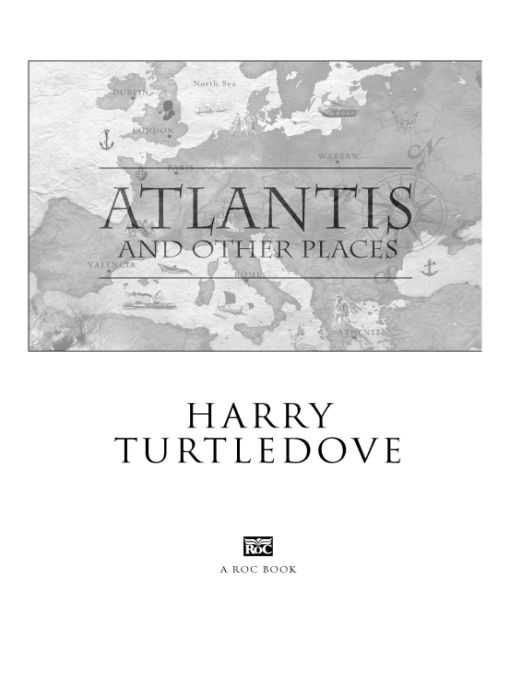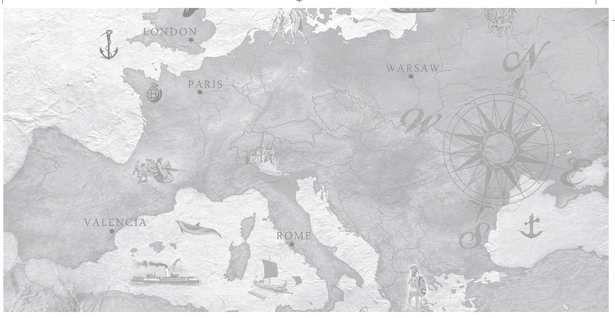Atlantis and Other Places
Read Atlantis and Other Places Online
Authors: Harry Turtledove


Table of Contents
ALSO BY HARRY TURTLEDOVE
Ruled Britannia
In the Presence of Mine Enemies
Days of Infamy
End of the Beginning
Opening Atlantis
The United States of Atlantis
Liberating Atlantis
BY HARRY TURTLEDOVE WRITING AS
DAN CHERNENKO
DAN CHERNENKO
The Chernagor Pirates
The Bastard King
The Scepter’s Return

ROC
Published by New American Library,
a division of Penguin Group (USA) Inc.,
375 Hudson Street, New York, New York 10014, USA
Penguin Group (Canada), 90 Eglinton Avenue East, Suite 700, Toronto,
Ontario M4P 2Y3, Canada (a division of Pearson Penguin Canada Inc.)
Penguin Books Ltd., 80 Strand, London WC2R 0RL, England
Penguin Ireland, 25 St. Stephen’s Green, Dublin 2,
Ireland (a division of Penguin Books Ltd.)
Penguin Group (Australia), 250 Camberwell Road, Camberwell,
Victoria 3124, Australia (a division of Pearson Australia Group Pty. Ltd.)
Penguin Books India Pvt. Ltd., 11 Community Centre,
Panchsheel Park, New Delhi - 110 017, India
Penguin Group (NZ), 67 Apollo Drive, Rosedale, North Shore 0632,
New Zealand (a division of Pearson New Zealand Ltd.)
Penguin Books (South Africa) (Pty.) Ltd., 24 Sturdee Avenue,
Rosebank, Johannesburg 2196, South Africa
Published by New American Library,
a division of Penguin Group (USA) Inc.,
375 Hudson Street, New York, New York 10014, USA
Penguin Group (Canada), 90 Eglinton Avenue East, Suite 700, Toronto,
Ontario M4P 2Y3, Canada (a division of Pearson Penguin Canada Inc.)
Penguin Books Ltd., 80 Strand, London WC2R 0RL, England
Penguin Ireland, 25 St. Stephen’s Green, Dublin 2,
Ireland (a division of Penguin Books Ltd.)
Penguin Group (Australia), 250 Camberwell Road, Camberwell,
Victoria 3124, Australia (a division of Pearson Australia Group Pty. Ltd.)
Penguin Books India Pvt. Ltd., 11 Community Centre,
Panchsheel Park, New Delhi - 110 017, India
Penguin Group (NZ), 67 Apollo Drive, Rosedale, North Shore 0632,
New Zealand (a division of Pearson New Zealand Ltd.)
Penguin Books (South Africa) (Pty.) Ltd., 24 Sturdee Avenue,
Rosebank, Johannesburg 2196, South Africa
Penguin Books Ltd., Registered Offices:
80 Strand, London WC2R 0RL, England
80 Strand, London WC2R 0RL, England
First published by Roc, an imprint of New American Library,
a division of Penguin Group (USA) Inc.
a division of Penguin Group (USA) Inc.
First Printing, December 2010
All rights reserved
Story copyrights can be found on page 441.
 REGISTERED TRADEMARK—MARCA REGISTRADA
REGISTERED TRADEMARK—MARCA REGISTRADALIBRARY OF CONGRESS CATALOGING-IN-PUBLICATION DATA:
Turtledove, Harry.
Atlantis, and other places/ Harry Turtledove.
p. cm.
Turtledove, Harry.
Atlantis, and other places/ Harry Turtledove.
p. cm.
eISBN : 978-1-101-47509-6
Without limiting the rights under copyright reserved above, no part of this publication may be reproduced, stored in or introduced into a retrieval system, or transmitted, in any form, or by any means (electronic, mechanical, photocopying, recording, or otherwise), without the prior written permission of both the copyright owner and the above publisher of this book.
PUBLISHER’S NOTE
These are works of fiction. Names, characters, places, and incidents either are the product of the author’s imagination or are used fictitiously, and any resemblance to actual persons, living or dead, business establishments, events, or locales is entirely coincidental.
The publisher does not have any control over and does not assume any responsibility for author or third-party Web sites or their content.
The scanning, uploading, and distribution of this book via the Internet or via any other means without the permission of the publisher is illegal and punishable by law. Please purchase only authorized electronic editions, and do not participate in or encourage electronic piracy of copyrighted materials. Your support of the author’s rights is appreciated.

AUDUBON IN ATLANTIS
Science fiction writers often read a wide variety of books. I was going through one on the ecology of New Zealand before humans arrived when it noted that New Zealand had drifted away from Australia about 85 million years ago. It occurred to me to wonder what would have happened if the same thing had happened to a large chunk of eastern North America at more or less the same time. Suppose that chunk had no native mammals except for bats. Suppose the Native Americans never found it—it would be in the middle of the Atlantic, after all. When Europeans came along, they’d almost certainly call an immense island right there Atlantis. ...
Delicate as if walking on eggs, the riverboat
Augustus Caesar
eased in alongside the quay at New Orleans. Colored roustabouts, bare to the waist, caught lines from the boat and made her fast. The steam whistle blew several long, happy blasts, telling the world the sternwheeler had arrived. Then black smoke stopped belching from the stacks as the crew shut down the engines.
Augustus Caesar
eased in alongside the quay at New Orleans. Colored roustabouts, bare to the waist, caught lines from the boat and made her fast. The steam whistle blew several long, happy blasts, telling the world the sternwheeler had arrived. Then black smoke stopped belching from the stacks as the crew shut down the engines.
The deck stopped quivering beneath John Audubon’s feet. He breathed a silent sigh of relief; for all the time he’d spent aboard boats and ships, he was not a good sailor, and knew he never would be. Any motion, no matter how slight, could make his stomach betray him. He sighed—a long sea voyage still lay ahead of him.
Edward Harris came up and stood alongside him. “Well, my friend, we’re on our way,” he said.
“It’s true—we are. And we shall do that which has not been done, while it may yet be done.” As Audubon always did, he gathered enthusiasm when he thought about the goal and not the means by which he had to accomplish it. His English was fluent, but heavily flavored by the French that was his birthspeech. Even with an accent, he would have spoken more mushily than he liked; he was nearer sixty than fifty, and had only a few teeth left. “Before long, Ed, either the great honkers will be gone from this world or I will.”
He waited impatiently till the gangplank thudded into place, then hurried off the
Augustus Caesar
onto dry land, or something as close to dry land as New Orleans offered. He was a good-sized man—about five feet ten—with shoulder-length gray hair combed straight back from his forehead and with bushy gray side whiskers that framed a long, strong-nosed face.
Augustus Caesar
onto dry land, or something as close to dry land as New Orleans offered. He was a good-sized man—about five feet ten—with shoulder-length gray hair combed straight back from his forehead and with bushy gray side whiskers that framed a long, strong-nosed face.
Men and women of every color, wearing everything from rags to frock coats and great hoop skirts, thronged the muddy, puddled street. Chatter, jokes, and curses crackled in Spanish, French, and English, and in every possible mixture and corruption of those tongues. Audubon heard far more English than he had when he first came to New Orleans half a lifetime earlier. It was a French town then, with the Spanish dons hanging on where and as they could. Times changed, though. He knew that too well.
Not far from the Cabildo stood the brick building that housed the Bartlett Line. Edward Harris following in his wake, Audubon went inside. A clerk nodded to them. “Good day, gentlemen,” he said in English. A generation earlier, the greeting would surely have come in French. “How may I be of service to you today?”
“I wish to purchase passage to Atlantis for the two of us,” Audubon replied.
“Certainly, sir.” The clerk didn’t bat an eye. “The
Maid of Orleans
sails for New Marseille and Avalon on the west coast in . . . let me see . . . five days. If you would rather wait another week, you can book places on the
Sea Queen
for the east. She puts in at St. Augustine, St. Denis, and Hanover, then continues on to London.”
Maid of Orleans
sails for New Marseille and Avalon on the west coast in . . . let me see . . . five days. If you would rather wait another week, you can book places on the
Sea Queen
for the east. She puts in at St. Augustine, St. Denis, and Hanover, then continues on to London.”
“We can reach the interior as easily from either coast,” Harris said.
“Just so.” Audubon nodded. “We would have to wait longer to leave for the east, the journey would be longer, and I would not care to set out from Hanover in any case. I have too many friends in the capital. With the kindest intentions in the world, they would sweep us up in their social whirl, and we should be weeks getting free of it. The
Maid of Orleans
it shall be.”
Maid of Orleans
it shall be.”
“You won’t be sorry, sir. She’s a fine ship.” The clerk spoke with professional enthusiasm. He took out a book of ticket forms and inked his pen. “In whose names shall I make these out?”
“I am John James Audubon,” Audubon replied. “With me travels my friend and colleague, Mr. Edward Harris.”
“Audubon?” The clerk started to write, then looked up, his face aglow. “
The
Audubon? The artist? The naturalist?”
The
Audubon? The artist? The naturalist?”
Audubon exchanged a secret smile with Edward Harris. Being recognized never failed to gratify him: he loved himself well enough to crave reminding that others loved him, too. When he swung back toward the clerk, he tried to make the smile modest. “I have the honor to be he, yes.”
The clerk thrust out his hand. As Audubon shook it, the young man said, “I cannot tell you how pleased I am to make your acquaintance, sir. Mr. Hiram Bartlett, the chairman of the shipping line, is a subscriber to your
Birds and Viviparous Quadrupeds of Northern Terranova and Atlantis
—the double elephant folio edition. He sometimes brings in one volume or another for the edification of his staff. I admire your art and your text in almost equal measure, and that is the truth.”
Birds and Viviparous Quadrupeds of Northern Terranova and Atlantis
—the double elephant folio edition. He sometimes brings in one volume or another for the edification of his staff. I admire your art and your text in almost equal measure, and that is the truth.”
“You do me too much credit,” Audubon said, in lieu of strutting and preening like a courting passenger pigeon. He was also glad to learn how prosperous Bartlett was. No one but a rich man could afford the volumes of the double elephant folio. They were big enough to show almost every bird and most beasts at life size, even if he had twisted poses and bent necks almost unnaturally here and there to fit creatures onto the pages’ Procrustean bed.
“Are you traveling to Atlantis to continue your researches?” the clerk asked eagerly.
“If fate is kind, yes,” Audubon replied. “Some of the creatures I hope to see are less readily found than they were in years gone by, while I”—he sighed—“I fear I am less well able to find them than I was in years gone by. Yet a man can do only what it is given to him to do, and I intend to try.”
Other books
Bedlam Burning by Geoff Nicholson
LoversFeud by Ann Jacobs
B-Berry and I Look Back by Dornford Yates
Cowboy Come Home by Kenny, Janette
Lost Girls by George D. Shuman
Nothing on Earth by Rachel Clark
The Heresy of Dr Dee by Rickman, Phil
Dreams of Origami by Elenor Gill
The Seacroft: a love story (Paines Creek Beach Book 2) by Lazar, Aaron Paul